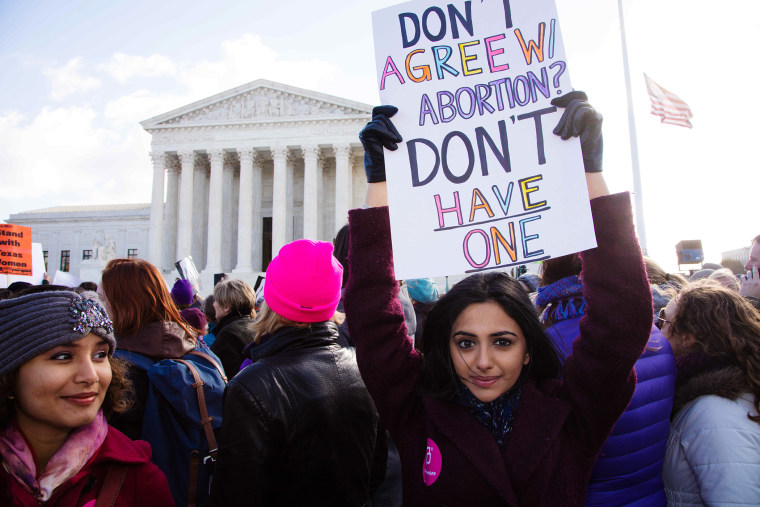In the coming weeks, we’ll know the future of abortion access in Texas.
While Texas’ deceptive health center shutdown law has provoked uncertainty for women in the state, what remains unequivocally clear is that closing abortion clinics doesn’t end the need for abortion. Abortion is something that 1 in 3 women will need in their lifetime, regardless of whether care is available. Closing health centers just leaves fewer safe options, puts pressure on the remaining centers, and creates added financial and emotional burdens on women trying to exercise their constitutional right.
Since Texas’ clinic shutdown law, known as HB2, was proposed in 2013, we have already seen the closure of more than half of the providers in the state, including some Planned Parenthood facilities, leaving fewer than 20 clinics that provide safe and legal abortion in the nation’s second largest state in both size and population. When health centers close, women who have made the decision to end a pregnancy face increased wait times at the remaining health centers — upwards of 20 days at some facilities — and are forced to drive long distances for care. They are also forced to delay abortion to later in pregnancy, which could push abortion later in pregnancy and out of reach for many women.
In no uncertain terms, as the American College of Obstetricians and Gynecologists has said, “When restrictions are placed on abortion access, women’s health suffers.”
RELATED: Shuttered: The end of abortion access in red state America
Planned Parenthood health center staff speak to women who are scared and desperate and don’t understand why certain restrictions may mean they can’t get an abortion. They are angry and sad, and they still sometimes can’t believe what has happened in Texas and in many states across the country, particularly in the South. I hate to think about what happens to the women who cannot reach a health care provider at all.
While the impact of Texas’ restrictive policies has already been significant, only nine women's health centers will remain in the entire state if the Supreme Court allows all of the devastating Texas measures to stand. Women living in rural areas will be hundreds of miles away from the closest abortion provider. They will face even longer wait times and may be forced to drive hours for care. Costs and time are insurmountable barriers for many women. Taking days off from work, finding child care (as 3 out of 5 women who need an abortion are already mothers), traveling to a major metropolitan city, and securing room and board while there is just not possible for too many of the 5.4 million Texas women of reproductive age. If they cannot obtain the care they need, some may take matters into their own hands.
If Texas’ law stands, there will be no remedy to the abortion access crisis in the state. Its medically unnecessary restrictions — which require abortion health centers to be mini-hospitals, or ambulatory surgical centers (ASC), and mandate that abortion providers have unnecessary admitting privileges at local hospitals — make it virtually impossible for new facilities to be built and for additional doctors to comply with the regulations.
Planned Parenthood, which already operates five of the abortion facilities left in Texas, will not be able to add additional ASCs at any time in the foreseeable future, as building such a facility could take years and involves enormous financial and logistical hurdles. Moreover, opening a new abortion facility in Texas is often faced with hostility from anti-abortion protesters and local organizations that put pressure on contractors and bring meritless zoning challenges.
RELATED: Hillary Clinton and Planned Parenthood unite after weathering the storm
Even if the ASC requirement alone did not pose a virtual brick wall, the admitting privileges requirement would further limit the availability of services. Prior to HB2, there were 48 physicians providing abortions in Texas. Today, because of baseless restrictions on providers — which the American Medical Association, the American College of Obstetricians and Gynecologists, and other leading health care experts have uniformly said serve no medical purpose and do nothing to promote women’s health — there are only 28 physicians with admitting privileges who perform abortions, according to the Texas Policy Evaluation Project, and many of them had admitting privileges before HB2 for other reasons. Abortion providers often cannot acquire admitting privileges for reasons that have nothing to do with the quality of their care. For example, privileges may be reserved for physicians who admit a minimum number of patients to the hospital each month, but because abortion is so extremely safe — more than 99 percent safe — many providers have little need to admit patients to hospitals and wouldn’t be able to reach the minimum requirement.
In October 2014, when the Fifth Circuit Court of Appeals allowed Texas to enforce the law before the Supreme Court stepped in, a dozen abortion clinics closed overnight. The next day, the Planned Parenthood call center received 572 phone calls from the Houston area — more than six times the usual call volume. Patients were understandably panicked after hearing from providers who couldn’t treat them or learning that their appointments had been canceled because their health centers closed in the blink of an eye. This is something I hope women in Texas never have to go through again.
When health centers close, the consequences are tremendous. This law is dangerous. The Supreme Court has a very important decision to make — making safe, legal abortion in this country accessible to women, or pushing abortion out of reach for those who cannot jump through the hoops of HB2.
Yvonne Gutierrez is the executive director of Planned Parenthood Texas Votes.
